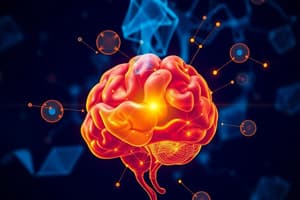Podcast
Questions and Answers
What is the primary concern of social sciences?
What is the primary concern of social sciences?
- Analyzing natural phenomena through experimental methods.
- Studying human social behavior and institutions in a scientific way. (correct)
- Investigating human biology and evolution.
- Understanding historical events through archaeological methods.
Which type of anthropology focuses specifically on language and communication?
Which type of anthropology focuses specifically on language and communication?
- Archaeological Anthropology
- Biological Anthropology
- Linguistic Anthropology (correct)
- Cultural Anthropology
Which category of economics examines the behavior of individual consumers?
Which category of economics examines the behavior of individual consumers?
- Microeconomics (correct)
- Macroeconomics
- Behavioral Economics
- National Economics
What does experimental research primarily aim to determine?
What does experimental research primarily aim to determine?
Which research type is characterized by its focus on synthesizing evidence from the past?
Which research type is characterized by its focus on synthesizing evidence from the past?
What type of economics uses econometrics to test theories?
What type of economics uses econometrics to test theories?
What is the purpose of longitudinal research?
What is the purpose of longitudinal research?
Which of the following methods is used for collecting and analyzing economic data?
Which of the following methods is used for collecting and analyzing economic data?
What is a primary characteristic of quantitative research?
What is a primary characteristic of quantitative research?
Which of the following best describes WEB 3.0?
Which of the following best describes WEB 3.0?
What is the main purpose of assistive media?
What is the main purpose of assistive media?
Which statement about convergent technologies is accurate?
Which statement about convergent technologies is accurate?
What is a key feature of qualitative research?
What is a key feature of qualitative research?
Which type of online system allows users to conduct financial transactions?
Which type of online system allows users to conduct financial transactions?
What best defines information and communication technology (ICT)?
What best defines information and communication technology (ICT)?
Which statement accurately describes the state of ICT technologies in WEB 2.0?
Which statement accurately describes the state of ICT technologies in WEB 2.0?
Flashcards are hidden until you start studying
Study Notes
Social Sciences Overview
- Discipline focused on studying human social behavior, institutions, and society scientifically.
- Natural Sciences aim to predict natural phenomena through controlled experiments.
- Humanities explore human reactions to events in life.
Scientific Method
- Systematic and logical approach for acquiring and explaining knowledge.
- Involves a step-by-step procedure for investigation.
Anthropology
- Study of human societies and cultures, divided into three main types:
- Biological Anthropology: Focuses on human biology and evolution.
- Linguistic Anthropology: Examines language and communication.
- Archaeology: Investigates history and material remains.
Economics
- Social science examining resource allocation among individuals, businesses, governments, and societies.
- Types of Economics:
- Microeconomics: Analyzes behavior of individual consumers.
- Macroeconomics: Looks at the economy as a whole.
- Markets: Places where economic activities occur.
- Economic Methods:
- Econometrics: Tests economic theories.
- Statistical Methods: Involve data collection and analysis.
Types of Research
- Descriptive Research: Addresses basic questions and describes existence regarding variables.
- Historical Research: Synthesizes past evidence and gathers data.
- Experimental Research: Investigates causal relationships using independent (IV) and dependent variables (DV).
- Exploratory Research: Develops tentative theories or hypotheses.
- Cross-Sectional Research: Compares similarities or differences across groups.
- Longitudinal Research: Studies the same sample over time to track changes.
- Sequential Research: Conducts research in a series across intervals.
- Case Study: Examines real-world issues in-depth.
Research Methodologies
- Quantitative Research: Tests hypotheses, expressed in numbers, larger sample sizes, and utilizes statistical analysis.
- Qualitative Research: Formulates hypotheses expressed in words, smaller sample sizes, using interviews and focus groups.
- Mixed Method: Combines quantitative and qualitative approaches.
Information and Communication Technology (ICT)
- Encompasses technological tools for transmitting, storing, creating, and sharing information.
- Infrastructure for modern computing and communication.
State of ICT Technologies
- Web 1.0: Early web era focusing on static web pages.
- Web 2.0: Current internet state emphasizing user-generated content and improved usability.
- Web 3.0: Encompasses personal data control, cryptocurrencies, and AI integration.
Convergent Technologies
- Involves the merging of different technologies to create new products or services.
Types of Media
- Social Media: Internet-based tools enabling user interaction and information sharing.
- Mobile Media: Includes handheld devices for communication and entertainment.
- Assistive Media: Internet services for individuals with visual and reading impairments.
Online Systems and Functions
- Digital platforms that facilitate communication and interaction across the internet.
- Types of Online Systems:
- Online Banking: Manages financial transactions digitally.
- Online Shopping Platforms: Facilitate purchasing goods and services online.
- Online Communication Tools: Enable various forms of digital communication.
ICT Platforms
- Social Media: Support content creation and sharing among users.
- Search Engines: Help locate relevant online information quickly.
- Communication Services: Tools that facilitate connections among people.
- Payment Systems: Systems used for settling financial transactions.
- Advertising Platforms: Tools for businesses to create and manage advertising campaigns.
Studying That Suits You
Use AI to generate personalized quizzes and flashcards to suit your learning preferences.




